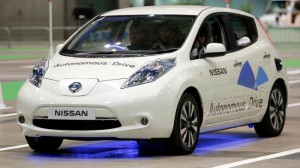 Congress will vote on the first federal laws for self-driving cars Wednesday.
Congress will vote on the first federal laws for self-driving cars Wednesday.
The U.S. House of Representatives will vote next week on a bill to speed the deployment of self-driving cars and stop states from banning fully-autonomous vehicles, according to congressional aides.
The bill was passed unanimously by a House panel in July. It would allow car manufacturers to obtain exemptions to deploy up to 25,000 cars that don’t meet current autonomous safety standards, i.e. requiring controls and humans to take the wheel when needed, in the first year. This number could increase to 100,000 cars annually over the next three years.
According to automakers and tech companies, it is likely that Congress will approve legislation before the end of 2017.
Federal regulations currently ban autonomous cars with no human controls on US roads.
The Department of Transportation unveiled the world’s first autonomous vehicle policy last year, setting safety standards for autonomous cars and offering guidelines for how states can legislate self-driving vehicles. However, many questions on issues such as safety, insurance, and cyber security still remain unanswered.
This new proposal would require companies and automakers to have permits to deploy their own autonomous vehicles and submit safety assessment reports to regulators. Yet, the regulation would not require them to get a pre-market approval of autonomous technologies.
According to Reuters.